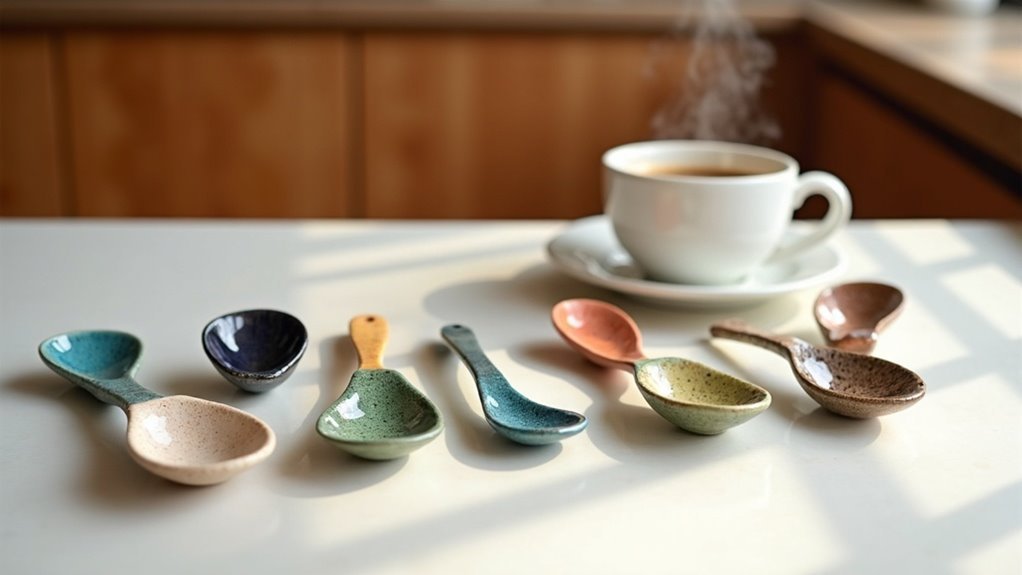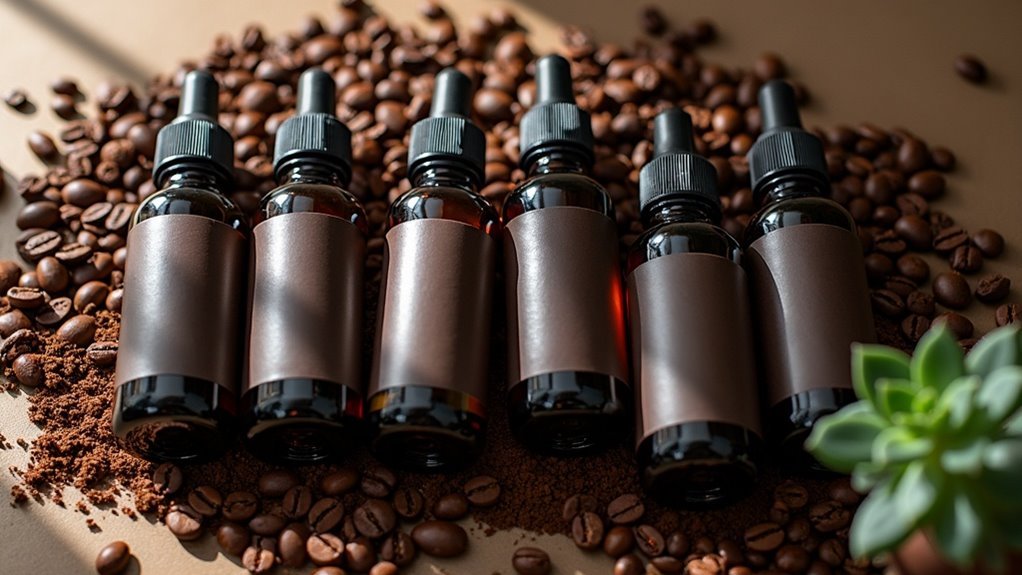Yes, coffee can worsen hot flashes. The caffeine in coffee acts as a vasodilator, which can raise body temperature and increase the frequency and intensity of hot flashes, particularly in postmenopausal women. While many enjoy coffee for its mood-enhancing effects, it’s important to consume it in moderation. Monitoring your coffee intake can help manage symptoms. Additionally, other triggers such as spicy foods and alcohol may contribute to hot flashes. Exploring lifestyle adjustments can provide further relief from these discomforts.
Key Takeaways
- High caffeine intake from coffee is linked to increased frequency and intensity of hot flashes, particularly in postmenopausal women.
- Caffeine in coffee acts as a vasodilator, potentially raising body temperature and exacerbating hot flashes.
- Moderating coffee consumption may help manage hot flashes effectively.
- Other common triggers for hot flashes include spicy foods, alcohol, stress, and anxiety, which can also be influenced by caffeine intake.
- Staying hydrated and maintaining a balanced diet while being mindful of coffee consumption can alleviate menopausal symptoms, including hot flashes.
Understanding Hot Flashes and Caffeine
While you might enjoy your morning coffee, it’s important to understand how caffeine can affect hot flashes, especially if you’re postmenopausal.
Research shows that high caffeine intake is linked to increased frequency and intensity of hot flashes in menopausal women. In a study analyzing 1,806 women, many reported that caffeine worsened their vasomotor symptoms.
Approximately 65% of postmenopausal women experience hot flashes, and for some, caffeine consumption exacerbates these symptoms.
While coffee may boost mood in perimenopausal women, it could be beneficial for postmenopausal women struggling with bothersome hot flashes and night sweats to consider limiting their caffeine intake.
The Role of Caffeine in Menopausal Symptoms
Caffeine, particularly from coffee, can play a complex role in menopausal symptoms, especially regarding hot flashes.
Research indicates that while coffee consumption may exacerbate these symptoms for some women, it can also enhance mood, memory, and concentration.
Understanding how coffee affects you personally is essential for effectively managing your menopausal experience.
Caffeine and Hot Flashes
As you navigate the challenges of menopause, you might find that your coffee consumption could play a role in the frequency and intensity of hot flashes.
Studies show that caffeine intake, particularly from coffee, is associated with increased vasomotor symptoms, such as hot flashes and night sweats, in about 65% of postmenopausal women. Caffeine acts as a vasodilator, potentially expanding blood vessels and raising your body temperature, which can trigger those uncomfortable episodes.
If you’re experiencing severe menopausal symptoms, consider moderating your coffee intake to help manage hot flashes effectively and improve your overall comfort during this phase. Enjoying your favorite brew in moderation may provide a balance between savoring your coffee and alleviating menopausal discomfort.
Mood Improvements From Caffeine
Managing hot flashes can be a challenge during menopause, but coffee might also offer some unexpected benefits, particularly for mood. Here’s how coffee consumption can help perimenopausal women:
- Mood Enhancement: Coffee is linked to improved mood and concentration, thanks to its caffeine content.
- Memory Boost: It may aid in sharpening memory, helping you feel more alert and focused.
- Symptom Management: While coffee can worsen hot flashes in postmenopausal women, it may alleviate mood issues for those in perimenopause.
Though findings are preliminary, exploring coffee’s role in managing menopausal symptoms could lead to better overall well-being during this transition.
Enjoying a cup of coffee could be a simple way to uplift your spirits while navigating this stage of life.
How Coffee Affects Your Body Temperature
When you consume coffee, its caffeine content can lead to a temporary increase in body temperature, which may intensify the discomfort of hot flashes.
Caffeine acts as a vasodilator, causing blood vessels to expand and potentially triggering hot flashes in sensitive individuals.
Studies show that caffeine consumption is linked to more frequent and intense hot flashes and night sweats, especially in postmenopausal women.
This rise in body temperature disrupts your body’s natural cooling mechanisms, making it harder to manage menopausal symptoms.
While coffee can enhance mood and cognitive function, it might also heighten the discomfort associated with hot flashes.
Other Common Triggers for Hot Flashes
Hot flashes can be triggered by a variety of factors beyond just caffeine, making it essential to recognize and manage these additional culprits.
Hot flashes can stem from various triggers beyond caffeine, highlighting the importance of recognizing and managing these additional factors.
Here are three common triggers you should be aware of:
- Spicy Foods: These can activate heat receptors in your body, exacerbating menopause symptoms.
- Alcohol: Some women report that red wine can trigger hot flashes, even if there’s no direct evidence to support this.
- Stress and Anxiety: These emotional states are significant contributors to hot flashes, and employing relaxation techniques may help alleviate symptoms.
Identifying and avoiding personal triggers can enhance your ability to manage hot flashes effectively, so be mindful of your lifestyle choices, especially in relation to your coffee and caffeine intake.
The Impact of Spicy Foods on Vasomotor Symptoms
Coffee can greatly influence vasomotor symptoms during menopause, often worsening hot flashes for many women. Caffeine, a key component in coffee, can stimulate the nervous system, which may trigger these uncomfortable symptoms.
Hormonal fluctuations during perimenopause can narrow your heat tolerance, making you more susceptible to hot flashes after consuming caffeinated beverages. Many women report that coffee exacerbates their vasomotor symptoms, leading to increased discomfort.
Additionally, the warmth from hot coffee can intensify hot flashes. To improve your overall comfort, it’s best to limit coffee intake and opt for beverages served at cooler temperatures.
Managing Alcohol Consumption During Menopause
As you navigate menopause, managing coffee consumption can play an essential role in mitigating uncomfortable symptoms like hot flashes and night sweats.
Consider these tips:
- Limit Caffeinated Coffee: Many women report that caffeine can trigger hot flashes; reducing intake may help.
- Monitor Timing: Be mindful of when you drink coffee. Consuming it close to bedtime can worsen sleep disturbances and contribute to night sweats.
- Identify Triggers: Understand your body’s response to coffee and alcohol intake. Awareness can notably assist in managing menopausal symptoms effectively.
Lifestyle Changes to Alleviate Hot Flashes
To alleviate hot flashes, start by identifying your personal triggers through a food diary, particularly focusing on your coffee consumption, as caffeine can significantly impact your symptoms.
Incorporating stress reduction techniques like mindfulness meditation can also be beneficial.
Additionally, making dietary adjustments to limit coffee intake and other known triggers may help manage the severity of your symptoms.
Identify Personal Triggers
Identifying personal triggers for coffee-related issues is essential for managing your consumption effectively, especially since various factors can exacerbate sensitivity to caffeine.
To help you pinpoint what affects you, consider these steps:
- Keep a coffee diary to track your caffeine intake and any related symptoms.
- Note any specific types of coffee or brewing methods that might trigger discomfort.
- Pay attention to your choice of additives; certain sweeteners or creamers may impact your experience.
Stress Reduction Techniques
Managing stress effectively can greatly enhance your overall coffee experience, especially during challenging times like menopause.
Stress and anxiety can influence your coffee consumption and sensory enjoyment, so employing stress reduction techniques is essential. Mindful coffee tasting, where you focus on the aroma and flavor of your brew, can considerably lower your stress levels and deepen your appreciation for your favorite beverage.
Additionally, keeping a journal to track your coffee intake and how it affects your mood can help you identify personal stress triggers. Regular physical activity, complemented by a well-timed coffee break, is also beneficial for stress management, leading to a more enjoyable coffee ritual.
Dietary Adjustments
While managing menopause, dietary adjustments can play an essential role in alleviating hot flashes, and coffee consumption is a key factor to consider. Here are some strategies related to coffee:
- Limit caffeine intake: Reducing coffee consumption may help decrease the frequency and intensity of hot flashes. Opt for decaffeinated versions or herbal teas instead.
- Avoid spicy foods: While not directly related to coffee, spicy foods can trigger hot flashes due to their heat-inducing properties. Pairing spicy foods with coffee may exacerbate symptoms.
- Stay hydrated: Proper hydration is crucial. Balance your coffee intake with water to help regulate body temperature, potentially easing hot flashes.
Keeping a food diary can also help identify your personal triggers, including how coffee affects your symptoms.
Adopting a balanced diet rich in whole foods, while being mindful of coffee consumption, can further support hormonal balance and overall health during menopause.
Monitoring Your Personal Triggers and Symptoms
Many coffee enthusiasts may find that monitoring their caffeine intake can significantly influence their experience during menopause. Keeping a food and symptom diary helps identify how coffee consumption affects hot flashes. Research indicates that around 79% of perimenopausal and 65% of postmenopausal women report experiencing these symptoms. By noting patterns between coffee consumption and the frequency or intensity of hot flashes, you can make informed dietary choices.
| Day | Caffeine Intake | Hot Flash Intensity |
|---|---|---|
| Monday | 2 cups coffee | Moderate |
| Tuesday | 1 cup coffee | Low |
| Wednesday | 0 cups coffee | None |
| Thursday | 3 cups coffee | High |








